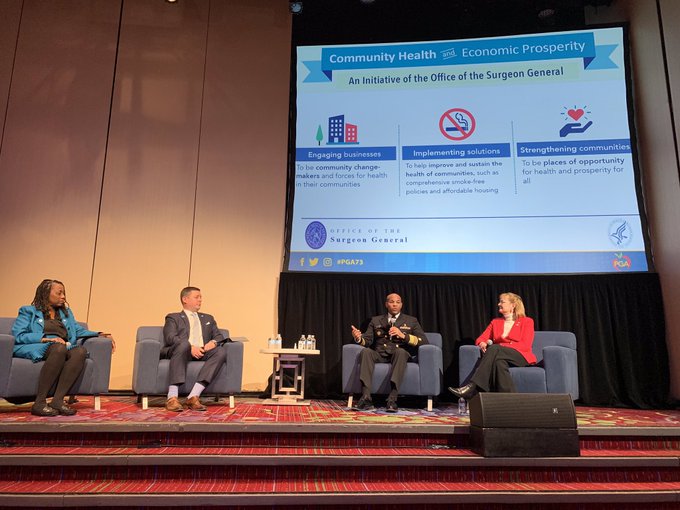
Share On Social!
The status quo for health in America is expensive and failing.
Medical care is costly for individuals, communities, businesses, and employers.
But the U.S. ranks only 27th in life expectancy out of 35 Organization of Economic Cooperation and Development (OECD) countries. It also has the highest prevalence of obesity, with even worse rates among Americans of color.
That’s why one of Surgeon General Dr. Jerome Adams’ priorities is to highlight and reverse inadequate investments in disease prevention and inequitable economic opportunities in our communities.
Last year, Adams launched the “Community Health and Economic Prosperity” or “CHEP” initiative.
“CHEP is the concept that community health and economic prosperity are inextricably linked,” according to the Adams. “When community health is poor, so is community prosperity. We can’t have one without the other.”
Strengthen Communities to be Places of Opportunity
Our environment shapes the opportunities available to us and the behaviors we adopt.
“The decisions people make are 100 percent dependent on the decisions that they have, or that they feel they have, in front of them,” Adams told the CEO of the Federal Reserve Bank of Atlanta.
Adams explained that health care is often the second-highest cost for most Fortune 500 companies after salaries.
When unequal community conditions lead to higher health care costs in one community compared to another community, these are factors in where the owner of a business will locate.
Thus, it is time to engage businesses as community changemakers and forces for health in their communities.
“We’ve got to help [businesses] understand that by focusing on housing, on food, on physical activity, on complete streets, on clean air laws, that you will see increased productivity at work, that you will see folks who show up on time and are able to be there more consistently, that you will see increased profitability, because unfortunately right now we know that health care is one-fifth of our GDP [gross domestic product], and it’s causing companies to move jobs overseas where those expenses aren’t quite as high,” Adams said.
For years, health advocates, including our team at Salud America!, have been urging the public sector to invest more in prevention, especially in Latino and other neighborhoods of color.
For example:
- 4 Powerful Tools Governors Can Use to Build Up Public Health
- How to Dismantle 5 Ugly Drivers of Health Inequity
- Transit and Compact Development are Solutions to Health Equity, COVID-19 Recovery
- Can Ending Single-Family Zones Help the Affordable Housing Crisis?
- Making the Case for Paid Family Leave
- On Streets of Injustice, Here’s How We Move toward Transportation Equity for Latinos
- This is How Cities Can Discover Where Affordable Housing and Transportation Meet (or Not)
- Planners, Here’s How to Unlock Health Equity in Your Community
“Community leaders can adopt dynamic land-use methods, public-private partnerships, and community involvement to build and revitalize Latino neighborhoods,” according to a Salud America! research review. “This can create affordable housing, connection to public transportation, and more green spaces.”
How CHEP Can Guide Communities in Change for Health, Wealth
Adams’ CHEP initiative is designed specifically for the private sector.
Specific actions include:
- Develop and publish a Surgeon General’s Report on Community Health and Economic Prosperity (CHEP): Making the Case
- Host convenings of community, health, and business leaders to explore critical topics affecting communities
- Build a national movement by amplifying messages and reaching diverse stakeholders through media and other communications outreach
“Making the case that these prevention strategies are also effective business strategies that can improve individual and community health and well-being, lead to greater productivity and economic prosperity, and create shared value for all stakeholders should increase demand for and resources to support these actions,” according to Adams.
You can urge both the public and private sectors to strengthen communities to be places of opportunity for health and prosperity for all.
Use the linked resources above and look for updates from CHEP to challenge the status quo and push for investments in prevention and equitable opportunity in your community.
You can also select your county name and get a customized Health Equity Report Card by Salud America! at UT Health San Antonio. You will see how your area stacks up in housing, transit, poverty, health care, healthy food, and other health equity issues compared to the rest of your state and nation.
“I invite you all to help me create a future where communities are built so people can more easily make healthy choices, and where businesses invest in those communities as a way of achieving a healthier workforce and a healthier bottom line,” Adams said.
By The Numbers
27
percent
of Latinos rely on public transit (compared to 14% of whites).



